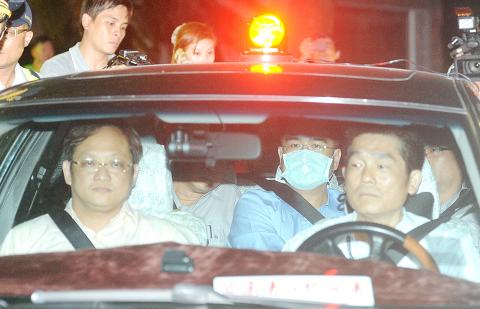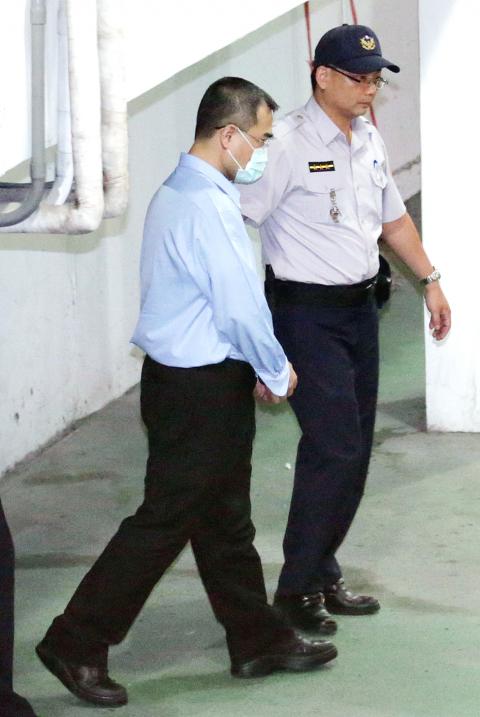Fallout from the scandal involving former Executive Yuan secretary-general Lin Yi-shih (林益世) could spread as Lin reportedly told the man from whom he allegedly demanded a bribe that he needed the money “to buy off some people” to help his company secure procurement contracts.
One day ahead of its scheduled publication date, the Chinese-language Next Magazine yesterday printed what it said was a transcript of conversations between Lin and Chen Chi-hsiang (陳啟祥), head of Kaohsiung-based Ti Yung Co (地勇選礦公司), a metal-recycling firm, that took place on Feb. 25 and March 10.
According to the transcript, Lin demanded that Chen give him NT$83 million (US$2.78 million) when Ti Yung was to renew contracts with CHC Resource Corp (中聯資源) and Chung Yao Corp (中耀企業), from which Lin had helped Ti Yung win contracts in 2010, in return for a NT$63 million bribe from Chen.

Photo: Liu Hsin-de, Taipei Times
CHC Resource Corp and Chung Yao Corp are subsidiaries of state-controlled China Steel Corp (CSC, 中鋼), the nation’s biggest steel maker.
The transcript showed that Chen did not agree to the demand and repeatedly expressed his wish that Lin could decrease the amount, but Lin refused.
“This time is different from last time because it was easy last time. This time it is difficult. The reason why I am imposing [such a large bribe] this time is that I am now in a different position ... I need to nobble some people to keep them quiet,” Lin said, according to the transcript.

Photo: Chien Jung-fong, Taipei Times
In 2010, Lin was a Chinese Nationalist Party (KMT) lawmaker representing a constituency in Greater Kaohsiung. He lost his re-election bid in January this year and was appointed secretary-general of the Executive Yuan in February.
The transcript said Lin told Chen that he needed to buy off several “weiyuan (委員),” but he did not clearly specify what positions they held.
Local media suspected the term weiyuan may have meant lawmakers, lifa weiyuan (立法委員).
In the transcript, Lin brought up the name of KMT Legislator Wang Jin-shih (王進士), based in Pingtung County, but it was not clear whether Wang was involved in this case.
Wang, who is visiting China, issued a statement yesterday saying he had nothing to do with Lin’s case. Wang said he had contacted CSC and CHC Resource Corp once to ask them if they could provide one of his constituents with slag because the petitioner’s company needed the raw material, but his attempt was in vain.
“I don’t know why Lin Yi-shih talked about me,” said Wang, who pledged to cooperate with prosecutors if necessary.
According to the magazine, Chen said he was repeatedly called by Lin’s assistant, Neih Tsun-hsien (聶存賢), to meet with Lin earlier this year.
Chen reportedly said he did follow Neih’s instructions and only decided to record his conversations with Lin in late February after Lin earlier went berserk in response to his unresponsive attitude.
In an eight-minute telephone call late in February, Chen said Lin yelled obscenities at him. After the phone tirade, Neih called him repeatedly to request a meeting, prompting Chen to buy a recording device before he went to see Lin on Feb. 25.
Chen said he did not decide to report the case to Next Magazine until early last month after CSC, CHC Resource Corp and Chung Yao Corp refused to supply his company with materials.
Their refusal to restore supplies to Ti Yung was in defiance of a decision by the Greater Kaohsiung Government on June 1 that Ti Yung had addressed environmental pollution concerns, Chen said.
After June 1, Chen said he called Neih and told him that he wished Lin could “let go” of his businesses. Lin refused and instead gave him an ultimatum, Chen said.
Chen said he was “driven to rebellion by tyranny.”
Lin reportedly told Chen that he had the sole mandate to decide on the heads of CHC Resource Corp and Chung Yao Corp.
Asked to comment yesterday, Premier Sean Chen (陳冲) dismissed Lin’s claims. He said the government appointed executives to state-owned and state-controlled businesses in accordance with procedure, rather than based on a decision made by a single person.
Lin probably said so to bluff Chen Chi-hsiang into thinking that he had that kind of power, the premier said.
The case surfaced on Wednesday last week when Next Magazine reported that Lin accepted a bribe of NT$63 million in 2010 from Chen to help the company secure a slag treatment contract from CSC’s subsidiary.
It was reported that President Ma Ying-jeou (馬英九) learned of the case on Tuesday last week before the magazine went to press.
Next Magazine reported yesterday that Ma failed to distance himself from the case at the very beginning because he believed Lin when he told him that Legislative Speaker Wang Jin-pyng (王金平), who also hails from Greater Kaohsiung, had fabricated the story to tarnish the Ma administration.

CHAOS: Iranians took to the streets playing celebratory music after reports of Khamenei’s death on Saturday, while mourners also gathered in Tehran yesterday Iranian Supreme Leader Ayatollah Ali Khamenei was killed in a major attack on Iran launched by Israel and the US, throwing the future of the Islamic republic into doubt and raising the risk of regional instability. Iranian state television and the state-run IRNA news agency announced the 86-year-old’s death early yesterday. US President Donald Trump said it gave Iranians their “greatest chance” to “take back” their country. The announcements came after a joint US and Israeli aerial bombardment that targeted Iranian military and governmental sites. Trump said the “heavy and pinpoint bombing” would continue through the week or as long

TRUST: The KMT said it respected the US’ timing and considerations, and hoped it would continue to honor its commitments to helping Taiwan bolster its defenses and deterrence US President Donald Trump is delaying a multibillion-dollar arms sale to Taiwan to ensure his visit to Beijing is successful, a New York Times report said. The weapons sales package has stalled in the US Department of State, the report said, citing US officials it did not identify. The White House has told agencies not to push forward ahead of Trump’s meeting with Chinese President Xi Jinping (習近平), it said. The two last month held a phone call to discuss trade and geopolitical flashpoints ahead of the summit. Xi raised the Taiwan issue and urged the US to handle arms sales to

State-run CPC Corp, Taiwan (CPC, 台灣中油) yesterday said that it had confirmed on Saturday night with its liquefied natural gas (LNG) and crude oil suppliers that shipments are proceeding as scheduled and that domestic supplies remain unaffected. The CPC yesterday announced the gasoline and diesel prices will rise by NT$0.2 and NT$0.4 per liter, respectively, starting Monday, citing Middle East tensions and blizzards in the eastern United States. CPC also iterated it has been reducing the proportion of crude oil imports from the Middle East and diversifying its supply sources in the past few years in response to geopolitical risks, expanding

Pro-democracy media tycoon Jimmy Lai’s (黎智英) fraud conviction and prison sentence were yesterday overturned by a Hong Kong court, in a surprise legal decision that comes soon after Lai was jailed for 20 years on a separate national security charge. Judges Jeremy Poon (潘兆初), Anthea Pang (彭寶琴) and Derek Pang (彭偉昌) said in the judgement that they allowed the appeal from Lai, and another defendant in the case, to proceed, as a lower court judge had “erred.” “The Court of Appeal gave them leave to appeal against their conviction, allowed their appeals, quashed the convictions and set aside the sentences,” the judges